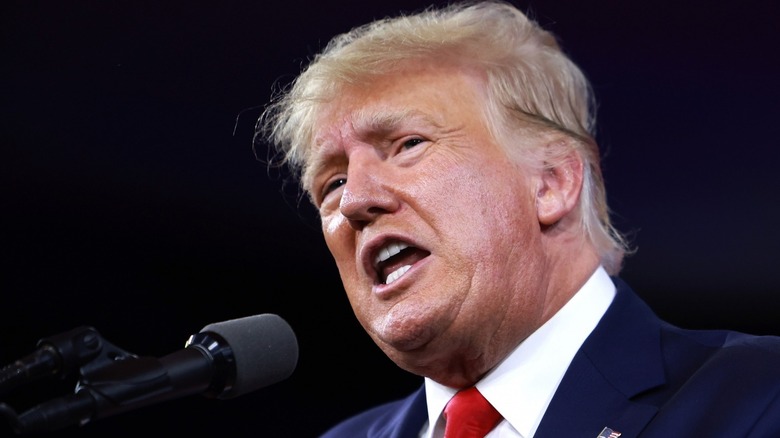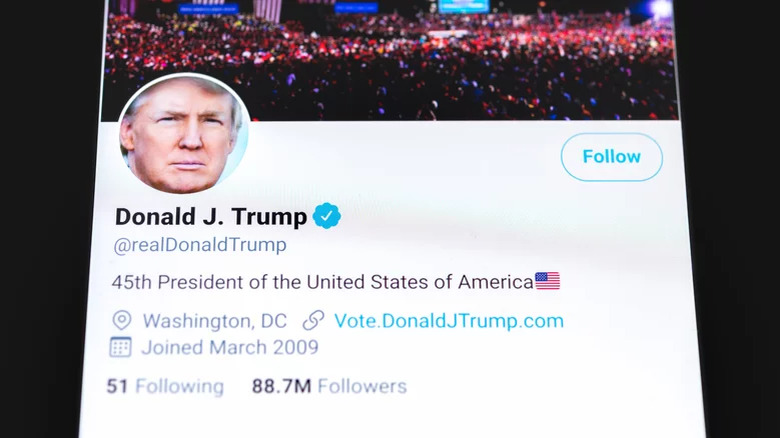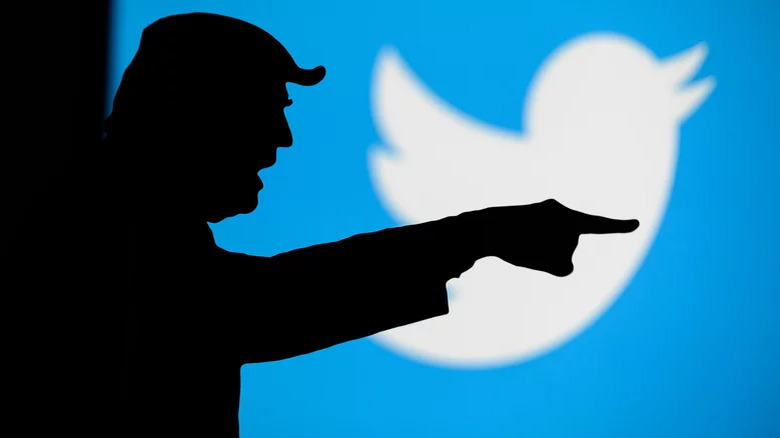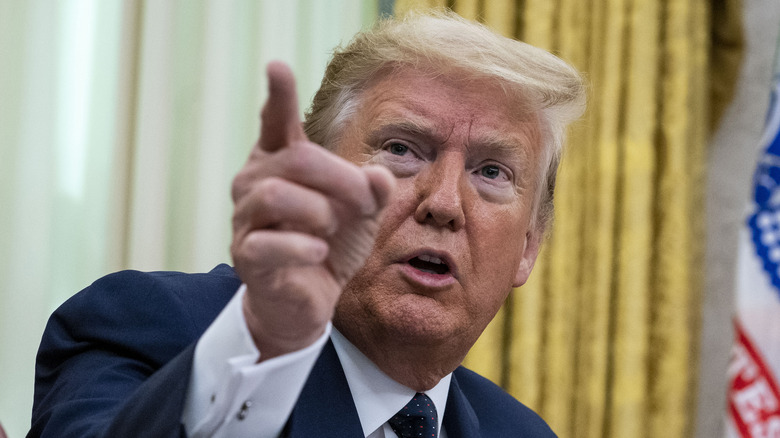Trump's Reinstated Twitter Account Still Isn't Enough For Him
Former President Donald Trump's return to Twitter could've been the end of a bad episode for the ex politician whose account was permanently banned last year, but reinstated a few days ago by Elon Musk. However, it appears that Trump is unwilling to let go of his vendetta against the platform for laying down the ban hammer, and he intends to proceed with his legal assault against the social media company.
Twitter's new CEO Musk launched a landmark move of offering "general amnesty" to suspended accounts all in the name of free speech and providing a non-biased platform for hosting dialogue from all sides of the political and ideological spectrum. Twitter is reportedly in the process of a massive reinstatement that involves revoking the suspension of roughly 62,000 accounts. Over six dozen of those accounts are said to command more than a million followers.
Trump is apparently in no mood to embrace Twitter just yet, despite the platform being his biggest megaphone in the past. He recently told CNBC that even if he is unbanned, he "won't be going back on Twitter." He boldly proclaimed that he will stick to Truth Social, a platform that has continued to bleed users and also found itself mired in some nagging business troubles.
A brief history of Trump's Twitter tussle
In the wake of the Capitol Hill riots on Jan. 6, 2021, Twitter was among the platforms that took disciplinary action against Trump's account. In an official blog published on Jan. 8, Twitter announced that his account has been permanently banned owing to the "risk of further incitement of violence." At the heart of the ban was Twitter's policy, which prohibits using the platform for encouraging violence.
The permanent account ban was handed to Trump three days after the incident on Capitol Hill and a day after two controversial tweets from the President. Back then, Twitter cited its "Glorification of Violence" policy, arriving at the conclusion that his tweets might serve as an encouragement for the bad actors. Moreover, the words used in his tweets were deemed as supportive of the whole fiasco.
Twitter also found Trump's tweet indicating that he "plans to continue to support, empower, and shield those who believe he won the election." The company argued that more armed protests were brewing in the wake of the Capitol Hill ruckus, and Trump's continued online presence might add more fuel to the fire.
Trump responded to the ban of his personal account by tweeting from his official government account (then @POTUS), claiming that Twitter is banning free speech, and that he was already discussing creating an alternative social media platform. These tweets were deleted by Twitter within minutes of being posted, while Truth Social launched a few months later.
What's the lawsuit all about?
In July last year, Trump spoke at his first press event since departing the White House, announcing plans to launch class action lawsuits against Twitter, YouTube, and Facebook for deplatforming him. "We're demanding an end to the shadow-banning, a stop to the silencing and a stop to the blacklisting, banishing and canceling that you know so well," Trump told the media back then.
The lawsuits were filed in the U.S. District Court for the Southern District of Florida, and sought "compensatory and punitive damages." The lawsuit also urged the companies to reverse the ban. In May this year, a U. S. District Judge James Donato tossed the lawsuit, rejecting Trump's allegations that Twitter was working as a "state actor" in banning him and silencing conservative voices.
Trump had also urged the court to classify Section 230 of the Communications Decency Act as unconstitutional, a request that was also rejected by the court. Back then, Musk separately clarified that his Twitter purchase worth $44 billion involved no communication with Trump, neither it had anything to do with the legal drama.
Earlier this month, Trump went knocking at the doors of an appeals court to revive his lawsuit against Twitter. Political analysts have argued that Trump's lawsuit against Twitter has little to do with winning damages. Instead, it is being seen as a statement for stirring mass support in the name fighting tech giants that are allegedly silencing conservatives (via Bloomberg).
What's next for Trump and Twitter?
Despite being welcomed back on Twitter, Trump has yet to tweet. However, the former president is in no mood to back down from his legal challenge against Twitter, despite experts claiming that the lawsuit doesn't stand a chance of a positive outcome in court. Trump's attorney John Coale told Bloomberg that his client won't be withdrawing his appeal to revive his legal challenge against Twitter.
"There's more to it than just letting him back in so we want to talk to see if we can figure something out," Coale was quoted as saying. He further hinted that Twitter should've talked to "the other side or wait," likely referring to Musk's decision of reinstating Trump's account, which happened following a public poll on Twitter. Musk, on the other hand, claimed in the past that banning Trump was a "grave mistake."
However, Trump's position with Twitter is quite tricky. Trump, who currently commands over 87 million followers on Twitter, has already announced plans for a second presidential run in 2024. In the past Trump has used Twitter to great effect in riling up support for his candidacy, and experts believe that he will likely make a return to his old ways for the sake of his campaign. However, Trump is also hesitant about leaving Truth Social, which has become a Republican stronghold while he sees himself as a bulwark for the conservative-leaning platform.



